Corporate Law Report: Constitution, Amendments and Shareholders
VerifiedAdded on 2021/02/17
|14
|4189
|25
Report
AI Summary
This report provides a comprehensive overview of Australian corporate law, focusing on the Corporations Act 2001. It delves into the intricacies of company constitutions, examining their purpose, content, and the legal framework governing their creation. The report then explores the process of amending a company's constitution, outlining the requirements for special resolutions and the crucial role of shareholder voting rights. A significant portion of the report is dedicated to the rights of shareholders, particularly the protection of minority shareholders during constitutional amendments. Through the analysis of various case studies, including Dignam and Lowry, Ashbury Railway Carriage & Iron Co v. Riche, and Allen v Gold Reefs of West Africa Ltd, the report elucidates key legal principles and their practical application. The report also examines relevant statutes, such as the Privacy Act 1988 and the Corporations Act 2001. Overall, the report aims to provide a clear understanding of the legal framework that governs businesses in Australia, with a focus on the constitution, amendments, and the balance between shareholder rights and corporate governance.
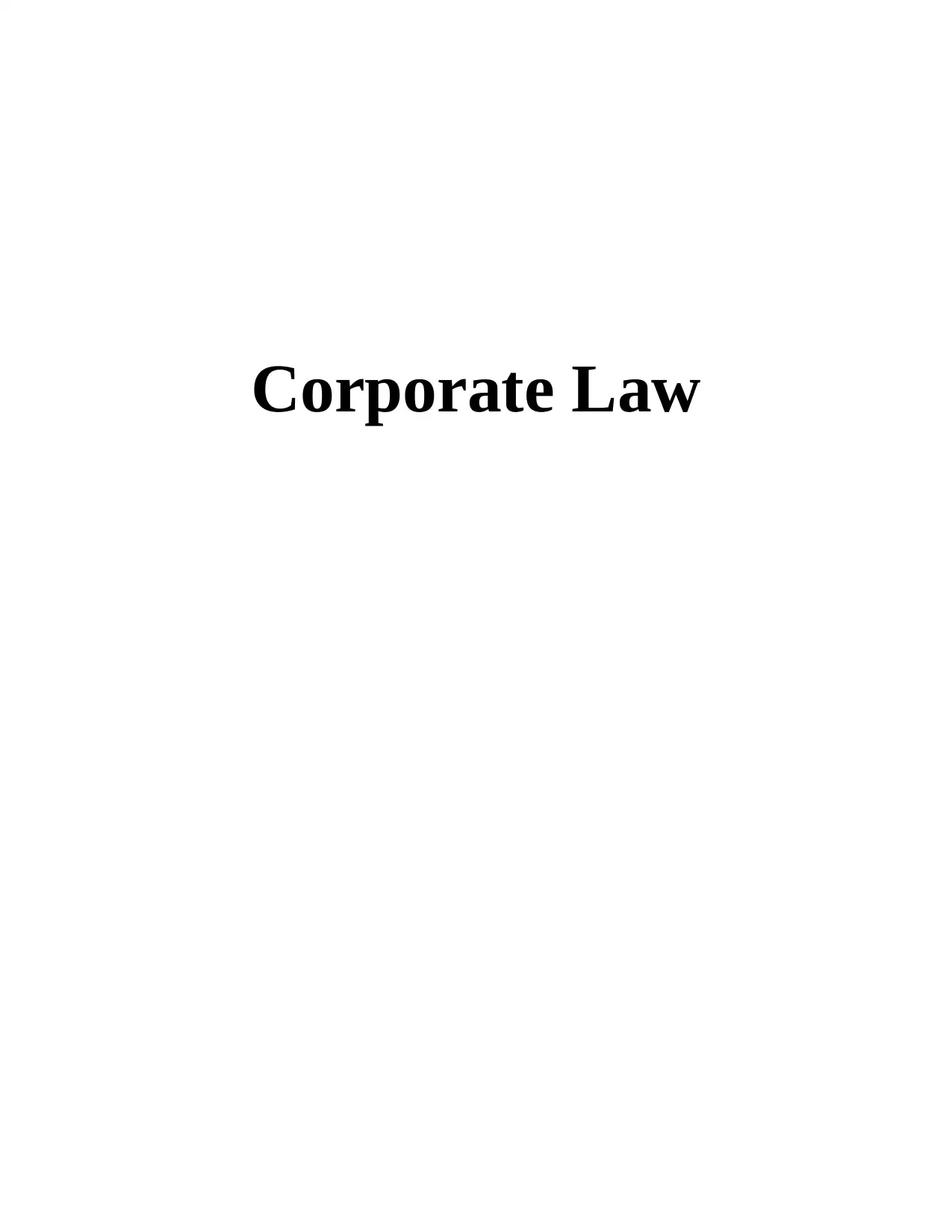
Corporate Law
Paraphrase This Document
Need a fresh take? Get an instant paraphrase of this document with our AI Paraphraser
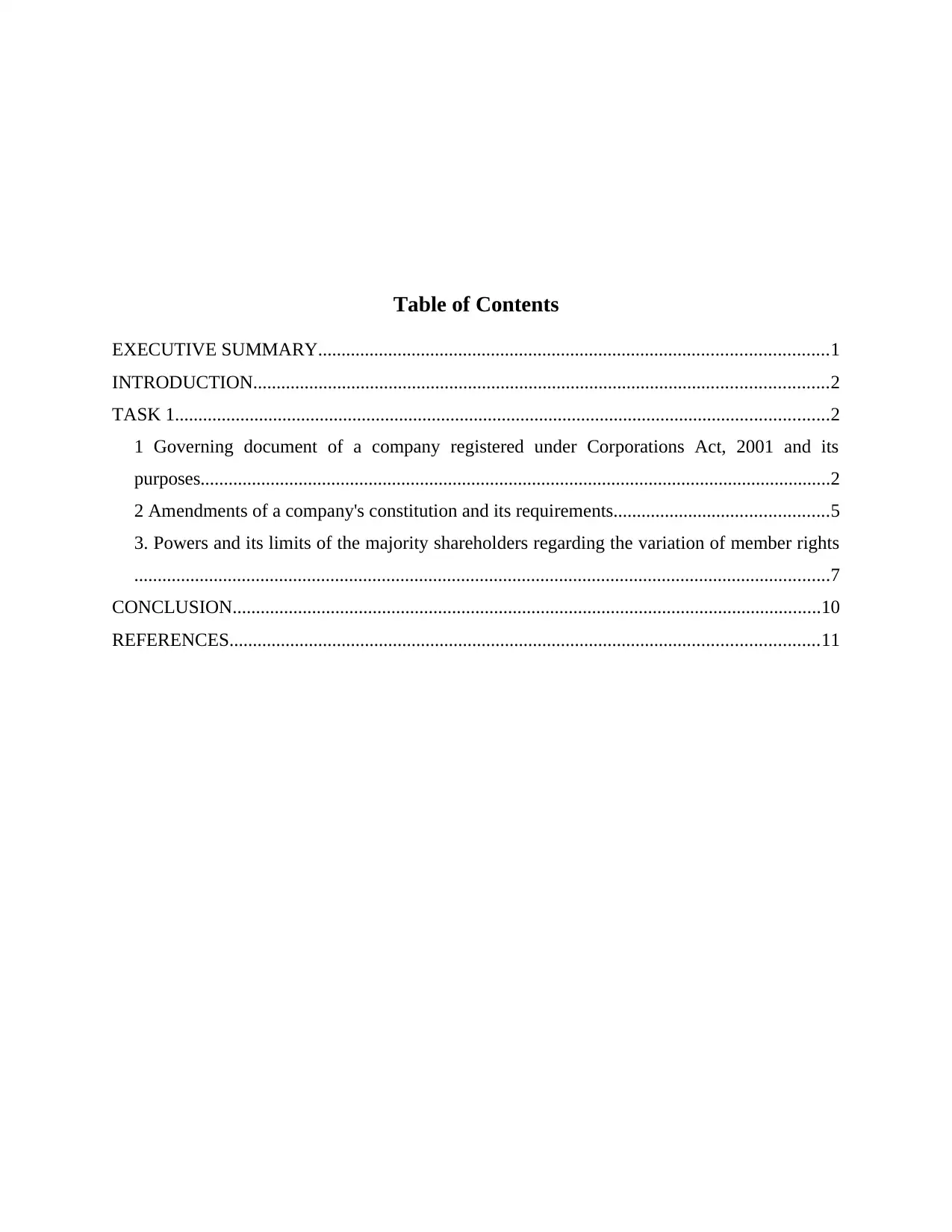
Table of Contents
EXECUTIVE SUMMARY.............................................................................................................1
INTRODUCTION...........................................................................................................................2
TASK 1............................................................................................................................................2
1 Governing document of a company registered under Corporations Act, 2001 and its
purposes.......................................................................................................................................2
2 Amendments of a company's constitution and its requirements..............................................5
3. Powers and its limits of the majority shareholders regarding the variation of member rights
.....................................................................................................................................................7
CONCLUSION..............................................................................................................................10
REFERENCES..............................................................................................................................11
EXECUTIVE SUMMARY.............................................................................................................1
INTRODUCTION...........................................................................................................................2
TASK 1............................................................................................................................................2
1 Governing document of a company registered under Corporations Act, 2001 and its
purposes.......................................................................................................................................2
2 Amendments of a company's constitution and its requirements..............................................5
3. Powers and its limits of the majority shareholders regarding the variation of member rights
.....................................................................................................................................................7
CONCLUSION..............................................................................................................................10
REFERENCES..............................................................................................................................11

⊘ This is a preview!⊘
Do you want full access?
Subscribe today to unlock all pages.

Trusted by 1+ million students worldwide
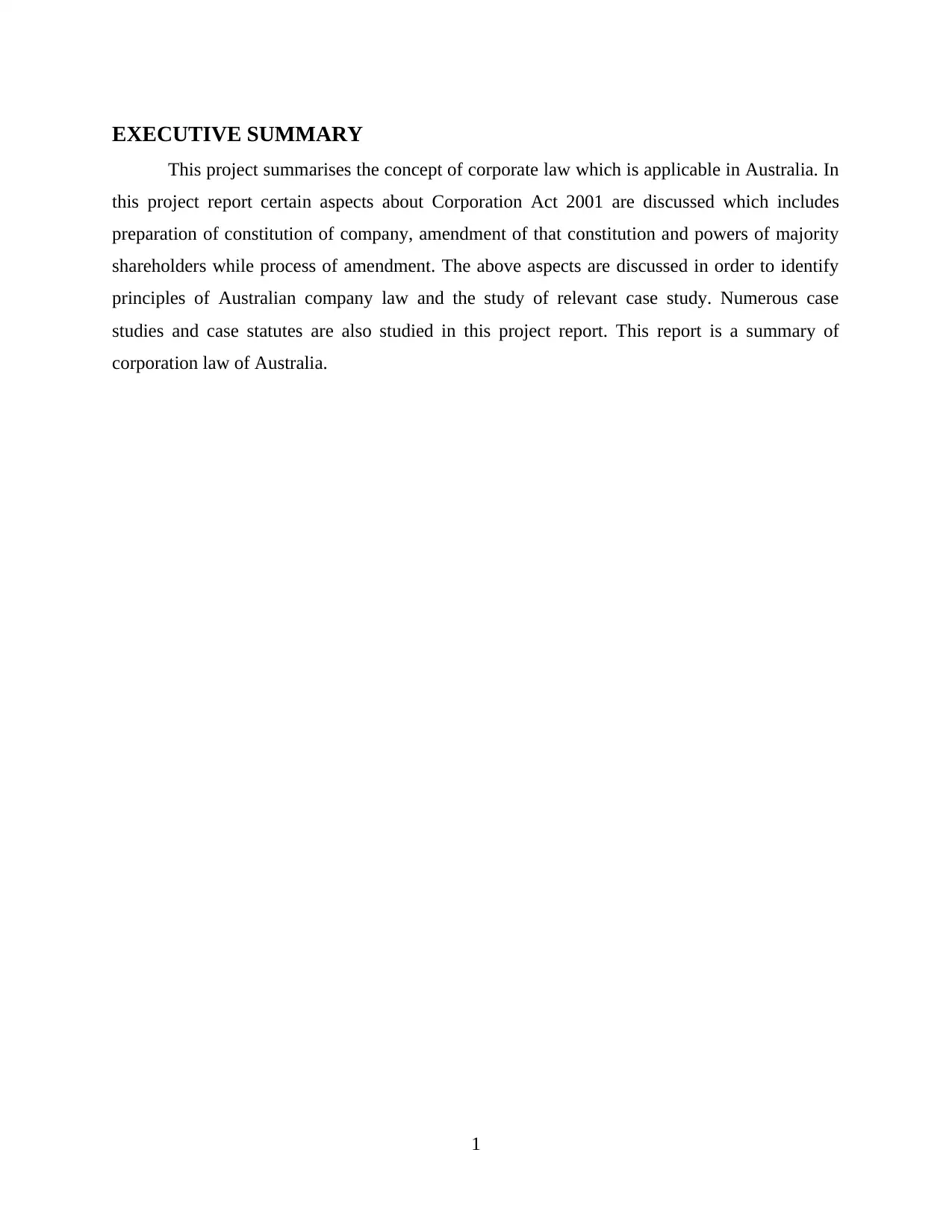
EXECUTIVE SUMMARY
This project summarises the concept of corporate law which is applicable in Australia. In
this project report certain aspects about Corporation Act 2001 are discussed which includes
preparation of constitution of company, amendment of that constitution and powers of majority
shareholders while process of amendment. The above aspects are discussed in order to identify
principles of Australian company law and the study of relevant case study. Numerous case
studies and case statutes are also studied in this project report. This report is a summary of
corporation law of Australia.
1
This project summarises the concept of corporate law which is applicable in Australia. In
this project report certain aspects about Corporation Act 2001 are discussed which includes
preparation of constitution of company, amendment of that constitution and powers of majority
shareholders while process of amendment. The above aspects are discussed in order to identify
principles of Australian company law and the study of relevant case study. Numerous case
studies and case statutes are also studied in this project report. This report is a summary of
corporation law of Australia.
1
Paraphrase This Document
Need a fresh take? Get an instant paraphrase of this document with our AI Paraphraser
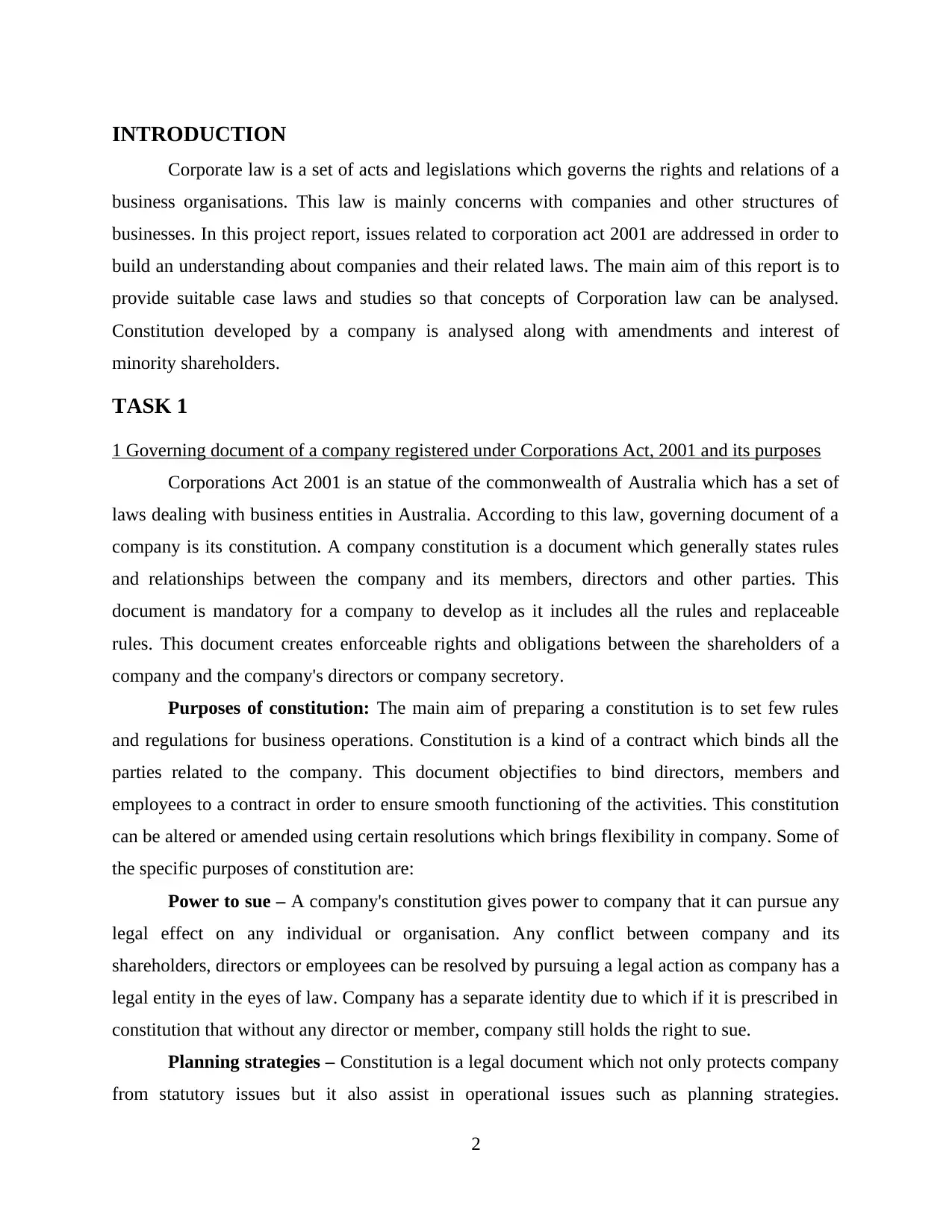
INTRODUCTION
Corporate law is a set of acts and legislations which governs the rights and relations of a
business organisations. This law is mainly concerns with companies and other structures of
businesses. In this project report, issues related to corporation act 2001 are addressed in order to
build an understanding about companies and their related laws. The main aim of this report is to
provide suitable case laws and studies so that concepts of Corporation law can be analysed.
Constitution developed by a company is analysed along with amendments and interest of
minority shareholders.
TASK 1
1 Governing document of a company registered under Corporations Act, 2001 and its purposes
Corporations Act 2001 is an statue of the commonwealth of Australia which has a set of
laws dealing with business entities in Australia. According to this law, governing document of a
company is its constitution. A company constitution is a document which generally states rules
and relationships between the company and its members, directors and other parties. This
document is mandatory for a company to develop as it includes all the rules and replaceable
rules. This document creates enforceable rights and obligations between the shareholders of a
company and the company's directors or company secretory.
Purposes of constitution: The main aim of preparing a constitution is to set few rules
and regulations for business operations. Constitution is a kind of a contract which binds all the
parties related to the company. This document objectifies to bind directors, members and
employees to a contract in order to ensure smooth functioning of the activities. This constitution
can be altered or amended using certain resolutions which brings flexibility in company. Some of
the specific purposes of constitution are:
Power to sue – A company's constitution gives power to company that it can pursue any
legal effect on any individual or organisation. Any conflict between company and its
shareholders, directors or employees can be resolved by pursuing a legal action as company has a
legal entity in the eyes of law. Company has a separate identity due to which if it is prescribed in
constitution that without any director or member, company still holds the right to sue.
Planning strategies – Constitution is a legal document which not only protects company
from statutory issues but it also assist in operational issues such as planning strategies.
2
Corporate law is a set of acts and legislations which governs the rights and relations of a
business organisations. This law is mainly concerns with companies and other structures of
businesses. In this project report, issues related to corporation act 2001 are addressed in order to
build an understanding about companies and their related laws. The main aim of this report is to
provide suitable case laws and studies so that concepts of Corporation law can be analysed.
Constitution developed by a company is analysed along with amendments and interest of
minority shareholders.
TASK 1
1 Governing document of a company registered under Corporations Act, 2001 and its purposes
Corporations Act 2001 is an statue of the commonwealth of Australia which has a set of
laws dealing with business entities in Australia. According to this law, governing document of a
company is its constitution. A company constitution is a document which generally states rules
and relationships between the company and its members, directors and other parties. This
document is mandatory for a company to develop as it includes all the rules and replaceable
rules. This document creates enforceable rights and obligations between the shareholders of a
company and the company's directors or company secretory.
Purposes of constitution: The main aim of preparing a constitution is to set few rules
and regulations for business operations. Constitution is a kind of a contract which binds all the
parties related to the company. This document objectifies to bind directors, members and
employees to a contract in order to ensure smooth functioning of the activities. This constitution
can be altered or amended using certain resolutions which brings flexibility in company. Some of
the specific purposes of constitution are:
Power to sue – A company's constitution gives power to company that it can pursue any
legal effect on any individual or organisation. Any conflict between company and its
shareholders, directors or employees can be resolved by pursuing a legal action as company has a
legal entity in the eyes of law. Company has a separate identity due to which if it is prescribed in
constitution that without any director or member, company still holds the right to sue.
Planning strategies – Constitution is a legal document which not only protects company
from statutory issues but it also assist in operational issues such as planning strategies.
2
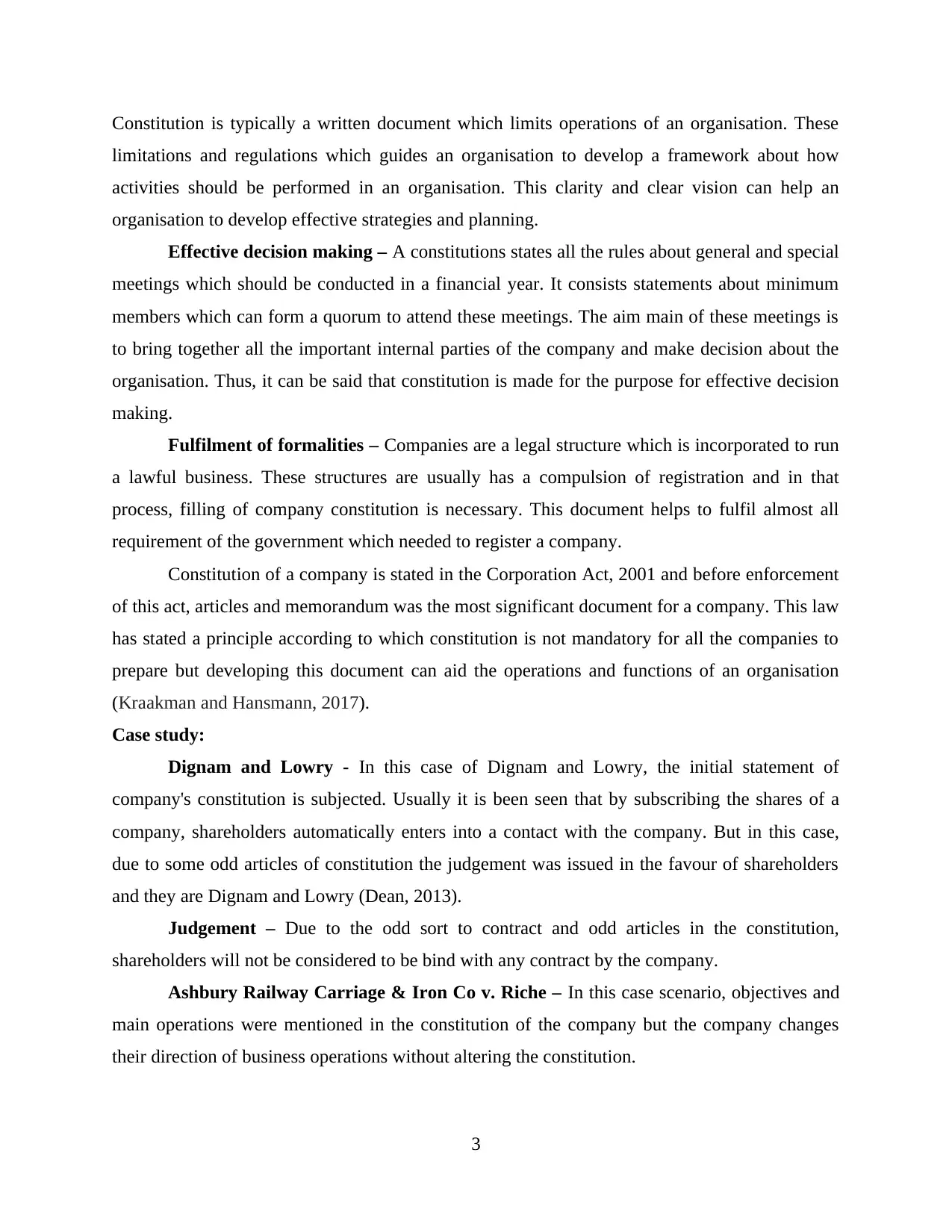
Constitution is typically a written document which limits operations of an organisation. These
limitations and regulations which guides an organisation to develop a framework about how
activities should be performed in an organisation. This clarity and clear vision can help an
organisation to develop effective strategies and planning.
Effective decision making – A constitutions states all the rules about general and special
meetings which should be conducted in a financial year. It consists statements about minimum
members which can form a quorum to attend these meetings. The aim main of these meetings is
to bring together all the important internal parties of the company and make decision about the
organisation. Thus, it can be said that constitution is made for the purpose for effective decision
making.
Fulfilment of formalities – Companies are a legal structure which is incorporated to run
a lawful business. These structures are usually has a compulsion of registration and in that
process, filling of company constitution is necessary. This document helps to fulfil almost all
requirement of the government which needed to register a company.
Constitution of a company is stated in the Corporation Act, 2001 and before enforcement
of this act, articles and memorandum was the most significant document for a company. This law
has stated a principle according to which constitution is not mandatory for all the companies to
prepare but developing this document can aid the operations and functions of an organisation
(Kraakman and Hansmann, 2017).
Case study:
Dignam and Lowry - In this case of Dignam and Lowry, the initial statement of
company's constitution is subjected. Usually it is been seen that by subscribing the shares of a
company, shareholders automatically enters into a contact with the company. But in this case,
due to some odd articles of constitution the judgement was issued in the favour of shareholders
and they are Dignam and Lowry (Dean, 2013).
Judgement – Due to the odd sort to contract and odd articles in the constitution,
shareholders will not be considered to be bind with any contract by the company.
Ashbury Railway Carriage & Iron Co v. Riche – In this case scenario, objectives and
main operations were mentioned in the constitution of the company but the company changes
their direction of business operations without altering the constitution.
3
limitations and regulations which guides an organisation to develop a framework about how
activities should be performed in an organisation. This clarity and clear vision can help an
organisation to develop effective strategies and planning.
Effective decision making – A constitutions states all the rules about general and special
meetings which should be conducted in a financial year. It consists statements about minimum
members which can form a quorum to attend these meetings. The aim main of these meetings is
to bring together all the important internal parties of the company and make decision about the
organisation. Thus, it can be said that constitution is made for the purpose for effective decision
making.
Fulfilment of formalities – Companies are a legal structure which is incorporated to run
a lawful business. These structures are usually has a compulsion of registration and in that
process, filling of company constitution is necessary. This document helps to fulfil almost all
requirement of the government which needed to register a company.
Constitution of a company is stated in the Corporation Act, 2001 and before enforcement
of this act, articles and memorandum was the most significant document for a company. This law
has stated a principle according to which constitution is not mandatory for all the companies to
prepare but developing this document can aid the operations and functions of an organisation
(Kraakman and Hansmann, 2017).
Case study:
Dignam and Lowry - In this case of Dignam and Lowry, the initial statement of
company's constitution is subjected. Usually it is been seen that by subscribing the shares of a
company, shareholders automatically enters into a contact with the company. But in this case,
due to some odd articles of constitution the judgement was issued in the favour of shareholders
and they are Dignam and Lowry (Dean, 2013).
Judgement – Due to the odd sort to contract and odd articles in the constitution,
shareholders will not be considered to be bind with any contract by the company.
Ashbury Railway Carriage & Iron Co v. Riche – In this case scenario, objectives and
main operations were mentioned in the constitution of the company but the company changes
their direction of business operations without altering the constitution.
3
⊘ This is a preview!⊘
Do you want full access?
Subscribe today to unlock all pages.

Trusted by 1+ million students worldwide
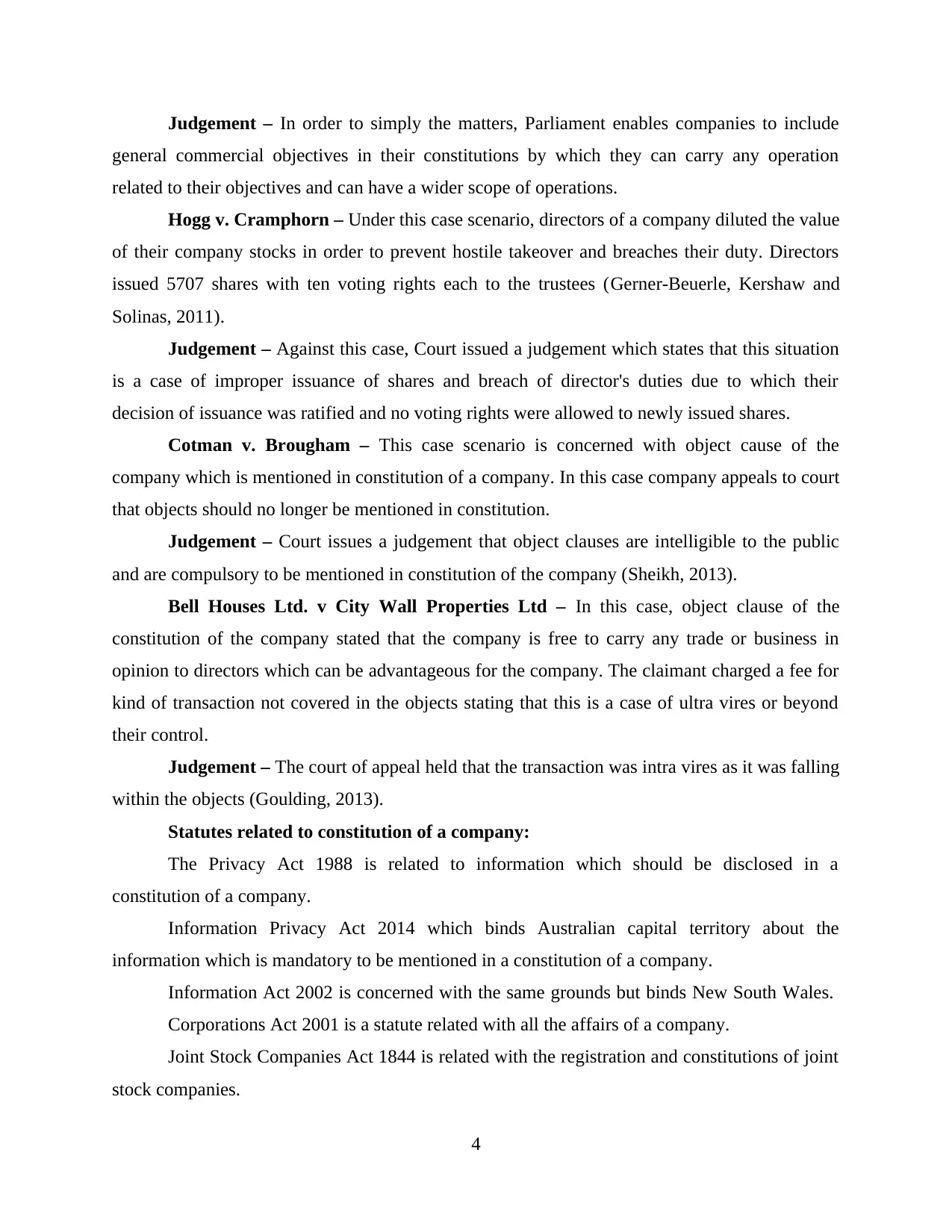
Judgement – In order to simply the matters, Parliament enables companies to include
general commercial objectives in their constitutions by which they can carry any operation
related to their objectives and can have a wider scope of operations.
Hogg v. Cramphorn – Under this case scenario, directors of a company diluted the value
of their company stocks in order to prevent hostile takeover and breaches their duty. Directors
issued 5707 shares with ten voting rights each to the trustees (Gerner-Beuerle, Kershaw and
Solinas, 2011).
Judgement – Against this case, Court issued a judgement which states that this situation
is a case of improper issuance of shares and breach of director's duties due to which their
decision of issuance was ratified and no voting rights were allowed to newly issued shares.
Cotman v. Brougham – This case scenario is concerned with object cause of the
company which is mentioned in constitution of a company. In this case company appeals to court
that objects should no longer be mentioned in constitution.
Judgement – Court issues a judgement that object clauses are intelligible to the public
and are compulsory to be mentioned in constitution of the company (Sheikh, 2013).
Bell Houses Ltd. v City Wall Properties Ltd – In this case, object clause of the
constitution of the company stated that the company is free to carry any trade or business in
opinion to directors which can be advantageous for the company. The claimant charged a fee for
kind of transaction not covered in the objects stating that this is a case of ultra vires or beyond
their control.
Judgement – The court of appeal held that the transaction was intra vires as it was falling
within the objects (Goulding, 2013).
Statutes related to constitution of a company:
The Privacy Act 1988 is related to information which should be disclosed in a
constitution of a company.
Information Privacy Act 2014 which binds Australian capital territory about the
information which is mandatory to be mentioned in a constitution of a company.
Information Act 2002 is concerned with the same grounds but binds New South Wales.
Corporations Act 2001 is a statute related with all the affairs of a company.
Joint Stock Companies Act 1844 is related with the registration and constitutions of joint
stock companies.
4
general commercial objectives in their constitutions by which they can carry any operation
related to their objectives and can have a wider scope of operations.
Hogg v. Cramphorn – Under this case scenario, directors of a company diluted the value
of their company stocks in order to prevent hostile takeover and breaches their duty. Directors
issued 5707 shares with ten voting rights each to the trustees (Gerner-Beuerle, Kershaw and
Solinas, 2011).
Judgement – Against this case, Court issued a judgement which states that this situation
is a case of improper issuance of shares and breach of director's duties due to which their
decision of issuance was ratified and no voting rights were allowed to newly issued shares.
Cotman v. Brougham – This case scenario is concerned with object cause of the
company which is mentioned in constitution of a company. In this case company appeals to court
that objects should no longer be mentioned in constitution.
Judgement – Court issues a judgement that object clauses are intelligible to the public
and are compulsory to be mentioned in constitution of the company (Sheikh, 2013).
Bell Houses Ltd. v City Wall Properties Ltd – In this case, object clause of the
constitution of the company stated that the company is free to carry any trade or business in
opinion to directors which can be advantageous for the company. The claimant charged a fee for
kind of transaction not covered in the objects stating that this is a case of ultra vires or beyond
their control.
Judgement – The court of appeal held that the transaction was intra vires as it was falling
within the objects (Goulding, 2013).
Statutes related to constitution of a company:
The Privacy Act 1988 is related to information which should be disclosed in a
constitution of a company.
Information Privacy Act 2014 which binds Australian capital territory about the
information which is mandatory to be mentioned in a constitution of a company.
Information Act 2002 is concerned with the same grounds but binds New South Wales.
Corporations Act 2001 is a statute related with all the affairs of a company.
Joint Stock Companies Act 1844 is related with the registration and constitutions of joint
stock companies.
4
Paraphrase This Document
Need a fresh take? Get an instant paraphrase of this document with our AI Paraphraser
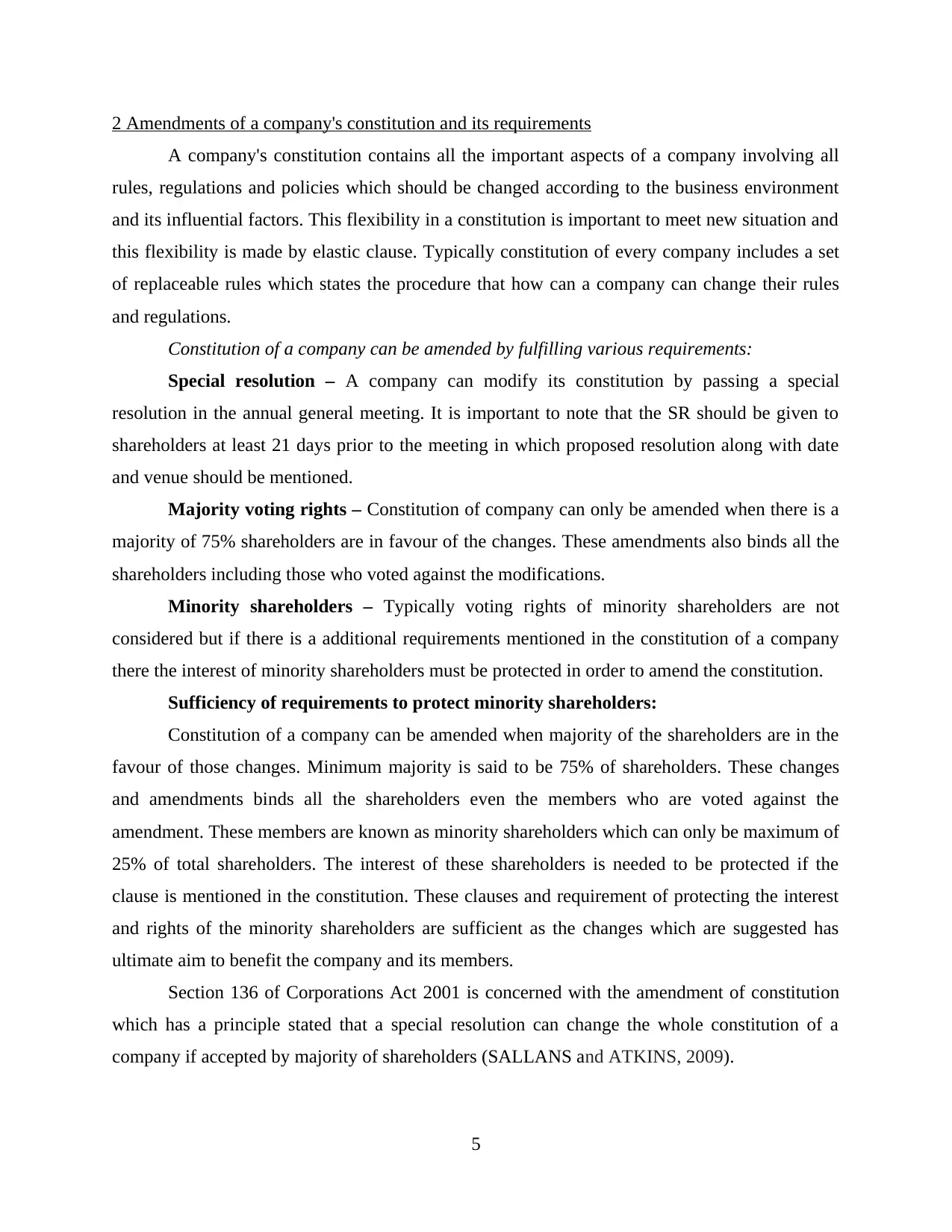
2 Amendments of a company's constitution and its requirements
A company's constitution contains all the important aspects of a company involving all
rules, regulations and policies which should be changed according to the business environment
and its influential factors. This flexibility in a constitution is important to meet new situation and
this flexibility is made by elastic clause. Typically constitution of every company includes a set
of replaceable rules which states the procedure that how can a company can change their rules
and regulations.
Constitution of a company can be amended by fulfilling various requirements:
Special resolution – A company can modify its constitution by passing a special
resolution in the annual general meeting. It is important to note that the SR should be given to
shareholders at least 21 days prior to the meeting in which proposed resolution along with date
and venue should be mentioned.
Majority voting rights – Constitution of company can only be amended when there is a
majority of 75% shareholders are in favour of the changes. These amendments also binds all the
shareholders including those who voted against the modifications.
Minority shareholders – Typically voting rights of minority shareholders are not
considered but if there is a additional requirements mentioned in the constitution of a company
there the interest of minority shareholders must be protected in order to amend the constitution.
Sufficiency of requirements to protect minority shareholders:
Constitution of a company can be amended when majority of the shareholders are in the
favour of those changes. Minimum majority is said to be 75% of shareholders. These changes
and amendments binds all the shareholders even the members who are voted against the
amendment. These members are known as minority shareholders which can only be maximum of
25% of total shareholders. The interest of these shareholders is needed to be protected if the
clause is mentioned in the constitution. These clauses and requirement of protecting the interest
and rights of the minority shareholders are sufficient as the changes which are suggested has
ultimate aim to benefit the company and its members.
Section 136 of Corporations Act 2001 is concerned with the amendment of constitution
which has a principle stated that a special resolution can change the whole constitution of a
company if accepted by majority of shareholders (SALLANS and ATKINS, 2009).
5
A company's constitution contains all the important aspects of a company involving all
rules, regulations and policies which should be changed according to the business environment
and its influential factors. This flexibility in a constitution is important to meet new situation and
this flexibility is made by elastic clause. Typically constitution of every company includes a set
of replaceable rules which states the procedure that how can a company can change their rules
and regulations.
Constitution of a company can be amended by fulfilling various requirements:
Special resolution – A company can modify its constitution by passing a special
resolution in the annual general meeting. It is important to note that the SR should be given to
shareholders at least 21 days prior to the meeting in which proposed resolution along with date
and venue should be mentioned.
Majority voting rights – Constitution of company can only be amended when there is a
majority of 75% shareholders are in favour of the changes. These amendments also binds all the
shareholders including those who voted against the modifications.
Minority shareholders – Typically voting rights of minority shareholders are not
considered but if there is a additional requirements mentioned in the constitution of a company
there the interest of minority shareholders must be protected in order to amend the constitution.
Sufficiency of requirements to protect minority shareholders:
Constitution of a company can be amended when majority of the shareholders are in the
favour of those changes. Minimum majority is said to be 75% of shareholders. These changes
and amendments binds all the shareholders even the members who are voted against the
amendment. These members are known as minority shareholders which can only be maximum of
25% of total shareholders. The interest of these shareholders is needed to be protected if the
clause is mentioned in the constitution. These clauses and requirement of protecting the interest
and rights of the minority shareholders are sufficient as the changes which are suggested has
ultimate aim to benefit the company and its members.
Section 136 of Corporations Act 2001 is concerned with the amendment of constitution
which has a principle stated that a special resolution can change the whole constitution of a
company if accepted by majority of shareholders (SALLANS and ATKINS, 2009).
5
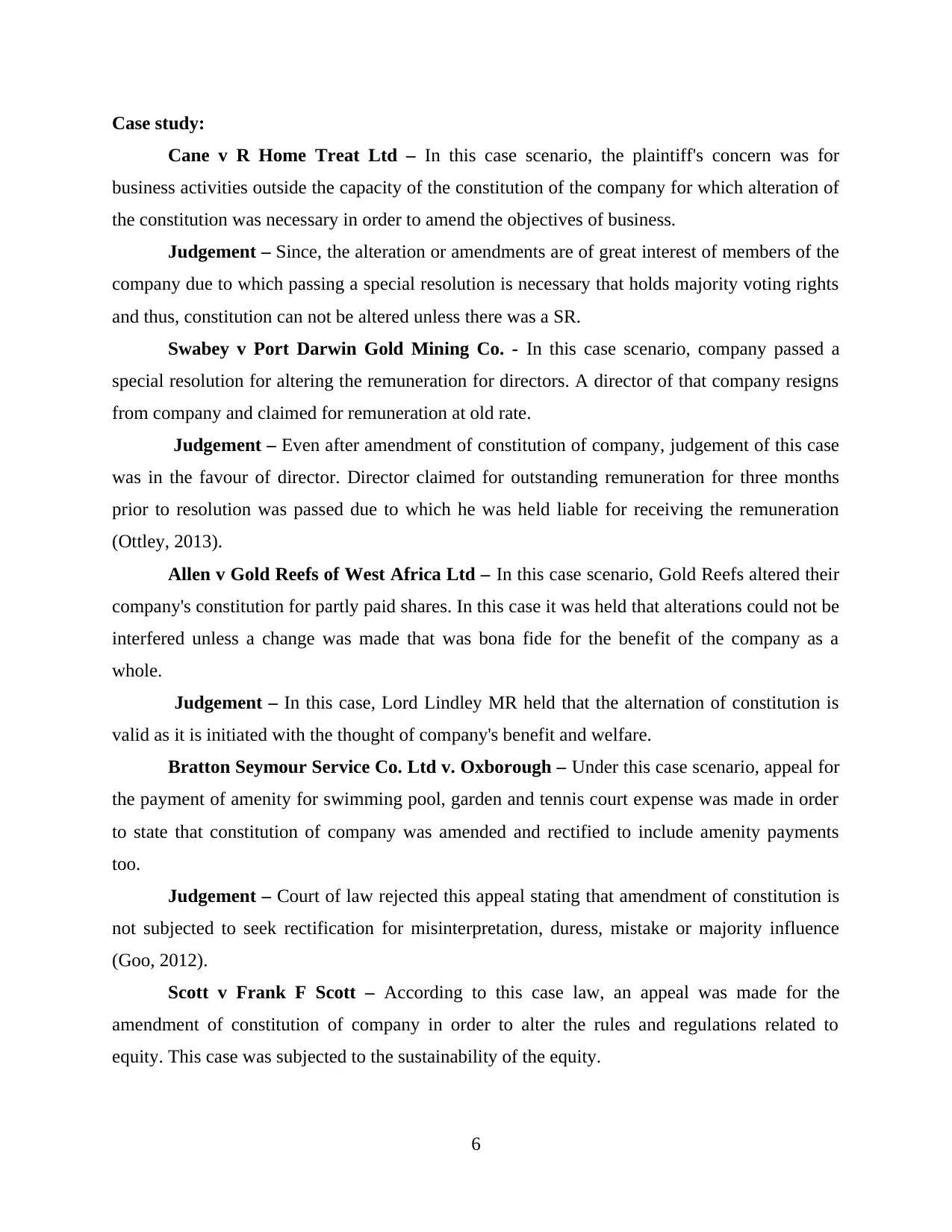
Case study:
Cane v R Home Treat Ltd – In this case scenario, the plaintiff's concern was for
business activities outside the capacity of the constitution of the company for which alteration of
the constitution was necessary in order to amend the objectives of business.
Judgement – Since, the alteration or amendments are of great interest of members of the
company due to which passing a special resolution is necessary that holds majority voting rights
and thus, constitution can not be altered unless there was a SR.
Swabey v Port Darwin Gold Mining Co. - In this case scenario, company passed a
special resolution for altering the remuneration for directors. A director of that company resigns
from company and claimed for remuneration at old rate.
Judgement – Even after amendment of constitution of company, judgement of this case
was in the favour of director. Director claimed for outstanding remuneration for three months
prior to resolution was passed due to which he was held liable for receiving the remuneration
(Ottley, 2013).
Allen v Gold Reefs of West Africa Ltd – In this case scenario, Gold Reefs altered their
company's constitution for partly paid shares. In this case it was held that alterations could not be
interfered unless a change was made that was bona fide for the benefit of the company as a
whole.
Judgement – In this case, Lord Lindley MR held that the alternation of constitution is
valid as it is initiated with the thought of company's benefit and welfare.
Bratton Seymour Service Co. Ltd v. Oxborough – Under this case scenario, appeal for
the payment of amenity for swimming pool, garden and tennis court expense was made in order
to state that constitution of company was amended and rectified to include amenity payments
too.
Judgement – Court of law rejected this appeal stating that amendment of constitution is
not subjected to seek rectification for misinterpretation, duress, mistake or majority influence
(Goo, 2012).
Scott v Frank F Scott – According to this case law, an appeal was made for the
amendment of constitution of company in order to alter the rules and regulations related to
equity. This case was subjected to the sustainability of the equity.
6
Cane v R Home Treat Ltd – In this case scenario, the plaintiff's concern was for
business activities outside the capacity of the constitution of the company for which alteration of
the constitution was necessary in order to amend the objectives of business.
Judgement – Since, the alteration or amendments are of great interest of members of the
company due to which passing a special resolution is necessary that holds majority voting rights
and thus, constitution can not be altered unless there was a SR.
Swabey v Port Darwin Gold Mining Co. - In this case scenario, company passed a
special resolution for altering the remuneration for directors. A director of that company resigns
from company and claimed for remuneration at old rate.
Judgement – Even after amendment of constitution of company, judgement of this case
was in the favour of director. Director claimed for outstanding remuneration for three months
prior to resolution was passed due to which he was held liable for receiving the remuneration
(Ottley, 2013).
Allen v Gold Reefs of West Africa Ltd – In this case scenario, Gold Reefs altered their
company's constitution for partly paid shares. In this case it was held that alterations could not be
interfered unless a change was made that was bona fide for the benefit of the company as a
whole.
Judgement – In this case, Lord Lindley MR held that the alternation of constitution is
valid as it is initiated with the thought of company's benefit and welfare.
Bratton Seymour Service Co. Ltd v. Oxborough – Under this case scenario, appeal for
the payment of amenity for swimming pool, garden and tennis court expense was made in order
to state that constitution of company was amended and rectified to include amenity payments
too.
Judgement – Court of law rejected this appeal stating that amendment of constitution is
not subjected to seek rectification for misinterpretation, duress, mistake or majority influence
(Goo, 2012).
Scott v Frank F Scott – According to this case law, an appeal was made for the
amendment of constitution of company in order to alter the rules and regulations related to
equity. This case was subjected to the sustainability of the equity.
6
⊘ This is a preview!⊘
Do you want full access?
Subscribe today to unlock all pages.

Trusted by 1+ million students worldwide
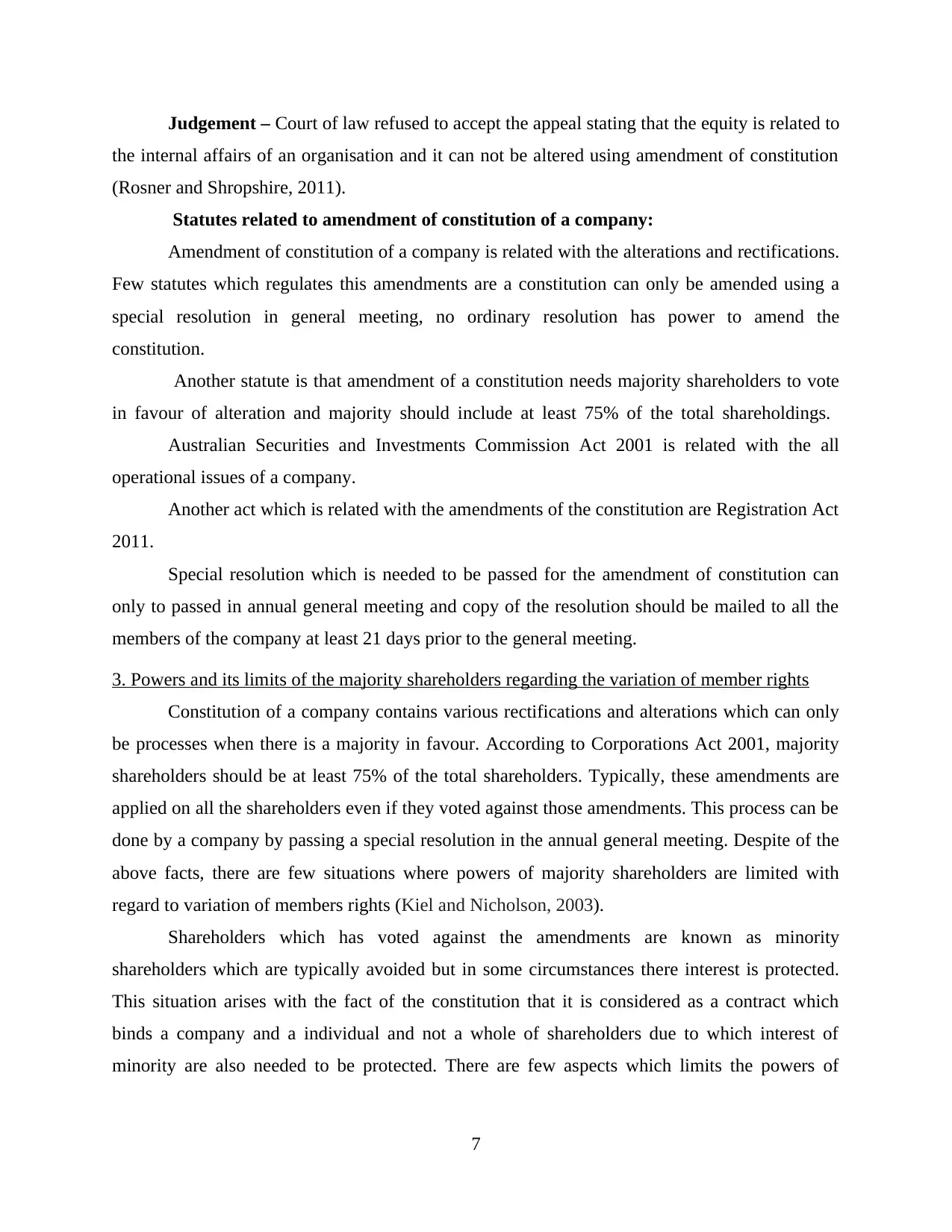
Judgement – Court of law refused to accept the appeal stating that the equity is related to
the internal affairs of an organisation and it can not be altered using amendment of constitution
(Rosner and Shropshire, 2011).
Statutes related to amendment of constitution of a company:
Amendment of constitution of a company is related with the alterations and rectifications.
Few statutes which regulates this amendments are a constitution can only be amended using a
special resolution in general meeting, no ordinary resolution has power to amend the
constitution.
Another statute is that amendment of a constitution needs majority shareholders to vote
in favour of alteration and majority should include at least 75% of the total shareholdings.
Australian Securities and Investments Commission Act 2001 is related with the all
operational issues of a company.
Another act which is related with the amendments of the constitution are Registration Act
2011.
Special resolution which is needed to be passed for the amendment of constitution can
only to passed in annual general meeting and copy of the resolution should be mailed to all the
members of the company at least 21 days prior to the general meeting.
3. Powers and its limits of the majority shareholders regarding the variation of member rights
Constitution of a company contains various rectifications and alterations which can only
be processes when there is a majority in favour. According to Corporations Act 2001, majority
shareholders should be at least 75% of the total shareholders. Typically, these amendments are
applied on all the shareholders even if they voted against those amendments. This process can be
done by a company by passing a special resolution in the annual general meeting. Despite of the
above facts, there are few situations where powers of majority shareholders are limited with
regard to variation of members rights (Kiel and Nicholson, 2003).
Shareholders which has voted against the amendments are known as minority
shareholders which are typically avoided but in some circumstances there interest is protected.
This situation arises with the fact of the constitution that it is considered as a contract which
binds a company and a individual and not a whole of shareholders due to which interest of
minority are also needed to be protected. There are few aspects which limits the powers of
7
the internal affairs of an organisation and it can not be altered using amendment of constitution
(Rosner and Shropshire, 2011).
Statutes related to amendment of constitution of a company:
Amendment of constitution of a company is related with the alterations and rectifications.
Few statutes which regulates this amendments are a constitution can only be amended using a
special resolution in general meeting, no ordinary resolution has power to amend the
constitution.
Another statute is that amendment of a constitution needs majority shareholders to vote
in favour of alteration and majority should include at least 75% of the total shareholdings.
Australian Securities and Investments Commission Act 2001 is related with the all
operational issues of a company.
Another act which is related with the amendments of the constitution are Registration Act
2011.
Special resolution which is needed to be passed for the amendment of constitution can
only to passed in annual general meeting and copy of the resolution should be mailed to all the
members of the company at least 21 days prior to the general meeting.
3. Powers and its limits of the majority shareholders regarding the variation of member rights
Constitution of a company contains various rectifications and alterations which can only
be processes when there is a majority in favour. According to Corporations Act 2001, majority
shareholders should be at least 75% of the total shareholders. Typically, these amendments are
applied on all the shareholders even if they voted against those amendments. This process can be
done by a company by passing a special resolution in the annual general meeting. Despite of the
above facts, there are few situations where powers of majority shareholders are limited with
regard to variation of members rights (Kiel and Nicholson, 2003).
Shareholders which has voted against the amendments are known as minority
shareholders which are typically avoided but in some circumstances there interest is protected.
This situation arises with the fact of the constitution that it is considered as a contract which
binds a company and a individual and not a whole of shareholders due to which interest of
minority are also needed to be protected. There are few aspects which limits the powers of
7
Paraphrase This Document
Need a fresh take? Get an instant paraphrase of this document with our AI Paraphraser
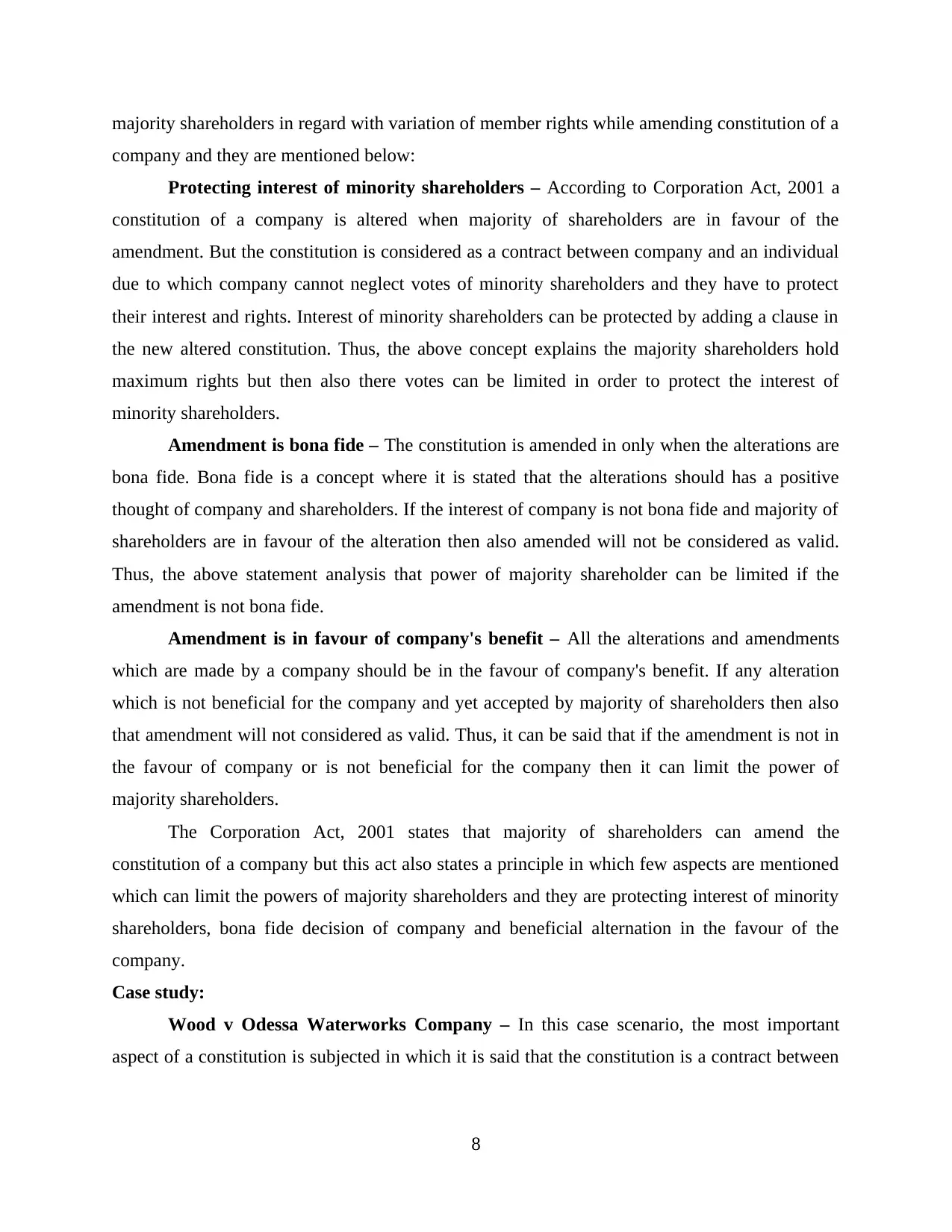
majority shareholders in regard with variation of member rights while amending constitution of a
company and they are mentioned below:
Protecting interest of minority shareholders – According to Corporation Act, 2001 a
constitution of a company is altered when majority of shareholders are in favour of the
amendment. But the constitution is considered as a contract between company and an individual
due to which company cannot neglect votes of minority shareholders and they have to protect
their interest and rights. Interest of minority shareholders can be protected by adding a clause in
the new altered constitution. Thus, the above concept explains the majority shareholders hold
maximum rights but then also there votes can be limited in order to protect the interest of
minority shareholders.
Amendment is bona fide – The constitution is amended in only when the alterations are
bona fide. Bona fide is a concept where it is stated that the alterations should has a positive
thought of company and shareholders. If the interest of company is not bona fide and majority of
shareholders are in favour of the alteration then also amended will not be considered as valid.
Thus, the above statement analysis that power of majority shareholder can be limited if the
amendment is not bona fide.
Amendment is in favour of company's benefit – All the alterations and amendments
which are made by a company should be in the favour of company's benefit. If any alteration
which is not beneficial for the company and yet accepted by majority of shareholders then also
that amendment will not considered as valid. Thus, it can be said that if the amendment is not in
the favour of company or is not beneficial for the company then it can limit the power of
majority shareholders.
The Corporation Act, 2001 states that majority of shareholders can amend the
constitution of a company but this act also states a principle in which few aspects are mentioned
which can limit the powers of majority shareholders and they are protecting interest of minority
shareholders, bona fide decision of company and beneficial alternation in the favour of the
company.
Case study:
Wood v Odessa Waterworks Company – In this case scenario, the most important
aspect of a constitution is subjected in which it is said that the constitution is a contract between
8
company and they are mentioned below:
Protecting interest of minority shareholders – According to Corporation Act, 2001 a
constitution of a company is altered when majority of shareholders are in favour of the
amendment. But the constitution is considered as a contract between company and an individual
due to which company cannot neglect votes of minority shareholders and they have to protect
their interest and rights. Interest of minority shareholders can be protected by adding a clause in
the new altered constitution. Thus, the above concept explains the majority shareholders hold
maximum rights but then also there votes can be limited in order to protect the interest of
minority shareholders.
Amendment is bona fide – The constitution is amended in only when the alterations are
bona fide. Bona fide is a concept where it is stated that the alterations should has a positive
thought of company and shareholders. If the interest of company is not bona fide and majority of
shareholders are in favour of the alteration then also amended will not be considered as valid.
Thus, the above statement analysis that power of majority shareholder can be limited if the
amendment is not bona fide.
Amendment is in favour of company's benefit – All the alterations and amendments
which are made by a company should be in the favour of company's benefit. If any alteration
which is not beneficial for the company and yet accepted by majority of shareholders then also
that amendment will not considered as valid. Thus, it can be said that if the amendment is not in
the favour of company or is not beneficial for the company then it can limit the power of
majority shareholders.
The Corporation Act, 2001 states that majority of shareholders can amend the
constitution of a company but this act also states a principle in which few aspects are mentioned
which can limit the powers of majority shareholders and they are protecting interest of minority
shareholders, bona fide decision of company and beneficial alternation in the favour of the
company.
Case study:
Wood v Odessa Waterworks Company – In this case scenario, the most important
aspect of a constitution is subjected in which it is said that the constitution is a contract between
8
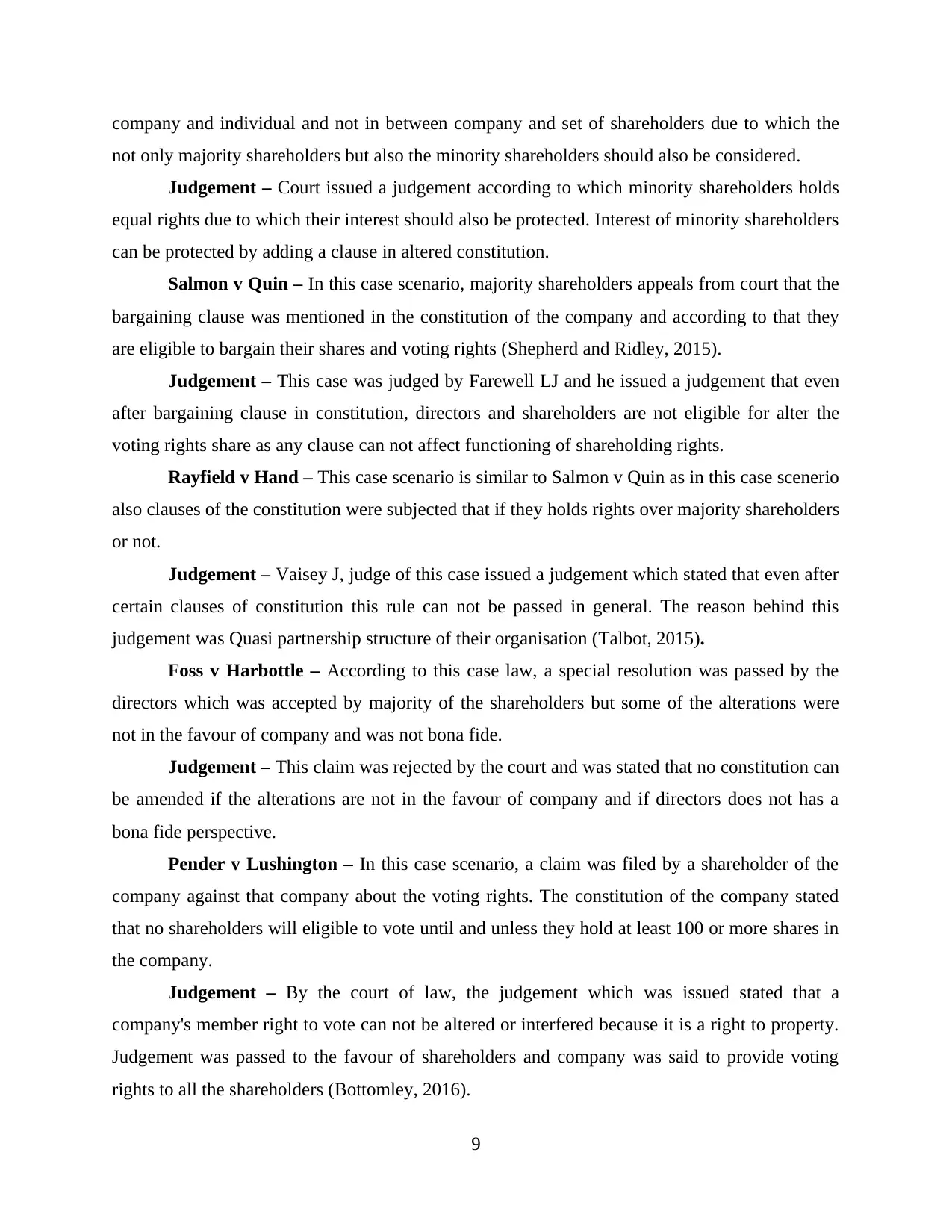
company and individual and not in between company and set of shareholders due to which the
not only majority shareholders but also the minority shareholders should also be considered.
Judgement – Court issued a judgement according to which minority shareholders holds
equal rights due to which their interest should also be protected. Interest of minority shareholders
can be protected by adding a clause in altered constitution.
Salmon v Quin – In this case scenario, majority shareholders appeals from court that the
bargaining clause was mentioned in the constitution of the company and according to that they
are eligible to bargain their shares and voting rights (Shepherd and Ridley, 2015).
Judgement – This case was judged by Farewell LJ and he issued a judgement that even
after bargaining clause in constitution, directors and shareholders are not eligible for alter the
voting rights share as any clause can not affect functioning of shareholding rights.
Rayfield v Hand – This case scenario is similar to Salmon v Quin as in this case scenerio
also clauses of the constitution were subjected that if they holds rights over majority shareholders
or not.
Judgement – Vaisey J, judge of this case issued a judgement which stated that even after
certain clauses of constitution this rule can not be passed in general. The reason behind this
judgement was Quasi partnership structure of their organisation (Talbot, 2015).
Foss v Harbottle – According to this case law, a special resolution was passed by the
directors which was accepted by majority of the shareholders but some of the alterations were
not in the favour of company and was not bona fide.
Judgement – This claim was rejected by the court and was stated that no constitution can
be amended if the alterations are not in the favour of company and if directors does not has a
bona fide perspective.
Pender v Lushington – In this case scenario, a claim was filed by a shareholder of the
company against that company about the voting rights. The constitution of the company stated
that no shareholders will eligible to vote until and unless they hold at least 100 or more shares in
the company.
Judgement – By the court of law, the judgement which was issued stated that a
company's member right to vote can not be altered or interfered because it is a right to property.
Judgement was passed to the favour of shareholders and company was said to provide voting
rights to all the shareholders (Bottomley, 2016).
9
not only majority shareholders but also the minority shareholders should also be considered.
Judgement – Court issued a judgement according to which minority shareholders holds
equal rights due to which their interest should also be protected. Interest of minority shareholders
can be protected by adding a clause in altered constitution.
Salmon v Quin – In this case scenario, majority shareholders appeals from court that the
bargaining clause was mentioned in the constitution of the company and according to that they
are eligible to bargain their shares and voting rights (Shepherd and Ridley, 2015).
Judgement – This case was judged by Farewell LJ and he issued a judgement that even
after bargaining clause in constitution, directors and shareholders are not eligible for alter the
voting rights share as any clause can not affect functioning of shareholding rights.
Rayfield v Hand – This case scenario is similar to Salmon v Quin as in this case scenerio
also clauses of the constitution were subjected that if they holds rights over majority shareholders
or not.
Judgement – Vaisey J, judge of this case issued a judgement which stated that even after
certain clauses of constitution this rule can not be passed in general. The reason behind this
judgement was Quasi partnership structure of their organisation (Talbot, 2015).
Foss v Harbottle – According to this case law, a special resolution was passed by the
directors which was accepted by majority of the shareholders but some of the alterations were
not in the favour of company and was not bona fide.
Judgement – This claim was rejected by the court and was stated that no constitution can
be amended if the alterations are not in the favour of company and if directors does not has a
bona fide perspective.
Pender v Lushington – In this case scenario, a claim was filed by a shareholder of the
company against that company about the voting rights. The constitution of the company stated
that no shareholders will eligible to vote until and unless they hold at least 100 or more shares in
the company.
Judgement – By the court of law, the judgement which was issued stated that a
company's member right to vote can not be altered or interfered because it is a right to property.
Judgement was passed to the favour of shareholders and company was said to provide voting
rights to all the shareholders (Bottomley, 2016).
9
⊘ This is a preview!⊘
Do you want full access?
Subscribe today to unlock all pages.

Trusted by 1+ million students worldwide
1 out of 14
Related Documents
Your All-in-One AI-Powered Toolkit for Academic Success.
+13062052269
info@desklib.com
Available 24*7 on WhatsApp / Email
![[object Object]](/_next/static/media/star-bottom.7253800d.svg)
Unlock your academic potential
Copyright © 2020–2026 A2Z Services. All Rights Reserved. Developed and managed by ZUCOL.




